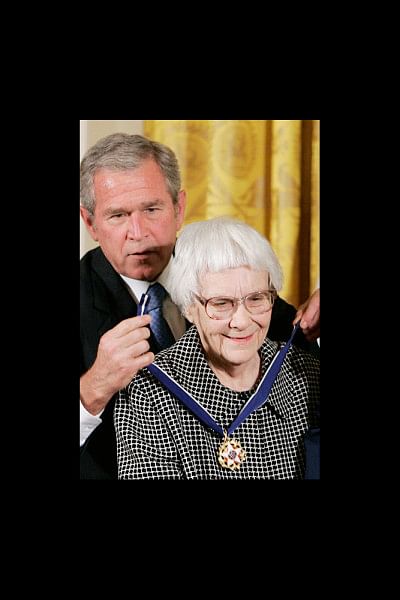Harper Lee, 'To Kill a Mockingbird' author, dies at 89

Harper Lee, who wrote one of America's most enduring literary classics, To Kill a Mockingbird, and surprised readers 55 years later with the publication of a second book about the same characters, died at the age of 89 on Friday.
A statement from Tonja Carter, Lee's attorney in her hometown of Monroeville, Alabama, said Lee had "passed away early this morning in her sleep" and that the death was unexpected.
For decades it had appeared that Lee's sole literary output would be "To Kill a Mockingbird" and the July 2015 publication of "Go Set a Watchman" was a surprising and somewhat controversial literary event.
In the first book, Atticus Finch was the adored father of the young narrator Scout and a lawyer who nobly but unsuccessfully defended a black man unjustly accused of raping a white woman. But in "Watchman," an older Atticus had racial views that left the grown-up Scout greatly disillusioned.
Lee reportedly had written "Go Set a Watchman" first but, at the suggestion of a wise editor, set it aside to tell a tale of race in the South from the child's point of view in the 1930s.
For many years, Lee, a shy woman with an engaging Southern drawl who never married, lived quietly and privately, always turning down interview requests. She alternated between living in a New York apartment and Monroeville, where she shared a home with her older sister, lawyer Alice Lee.

"When I saw her just six weeks ago, she was full of life, her mind and mischievous wit as sharp as ever," her agent, Andrew Nurnberg, said in a statement. "She was quoting Thomas More and setting me straight on Tudor history."
Spencer Madrie, owner of the Ol' Curiosities & Book Shoppe dedicated to the work of Lee and other Southern authors, said Monroeville was in a somber mood as word of Lee's death spread.
"You wish somebody like that could go on forever and be this lifelong legend," he said. "You don't ever consider somebody like that passing, even though her legacy will last for generations after."
Lee's state of mind would become an issue when plans were announced to publish Go Set a Watchman last year. Some friends said that after the death of her sister Alice, who handled Harper's affairs, lawyer Tonja Carter had manipulated Lee to approve publication. Discovered manuscript
Carter had said she came across the "Watchman" manuscript while doing legal work for Lee in 2014 and an investigation by Alabama state officials found there was no coercion in getting Lee's permission to publish.
Lee's literary output had been a matter of speculation for decades before Go Set a Watchman. She acknowledged she could not top the Pulitzer Prize-winning "Mockingbird" but friends said she had worked for years on at least two other books before abandoning them.
A family friend, the Reverend Thomas Lane Butts, told an Australian interviewer Lee had said she did not publish again because she did not want to endure the pressure and publicity of another book and because she had said all that she wanted to say.
Lee essentially quit giving interviews in 1964 and rarely made public appearances but in November 2007 went to the White House to accept a Presidential Medal of Freedom from President George W Bush, who called her book "a gift to the entire world."
She also regularly attended an annual luncheon at the University of Alabama to meet with the winners of a high school essay contest on the subject of her book.
Changing racial views
Nelle Harper Lee was born April 28, 1926, in Monroeville, the youngest of four children of A.C. and Frances Finch Lee and a descendant of Civil War General Robert E Lee. Like Scout, Lee grew up a tomboy.

In 1956 friends Michael and Joy Brown gave Lee a special Christmas gift, a year of financial support so she could work full time on "To Kill a Mockingbird."
The book was published in 1960, shortly after the dawn of the U.S. civil rights movement, and would sell an estimated 30 million copies. It would become required reading in many American schools but the American Library Association said it was frequently challenged by those who did not like its subject matter.
Lee also played a key role in researching another great American book by Truman Capote, her childhood friend and the inspiration for the frail, precocious Dill in "To Kill a Mockingbird."
In 1959 she accompanied Capote to Holcombe, Kansas, to work on "In Cold Blood," the chilling account of the murders of a farming family. Her mannerly, down-home approach undoubtedly smoothed the way for the flamboyant Capote.
There was speculation that Capote helped her write To Kill a Mockingbird the book but in his 2006 biography, "Mockingbird: A Portrait of Harper Lee," Charles J Shields disputed that. He also said Lee's contribution to Capote's In Cold Blood was greater than believed.
Lee's sister said the authors eventually fell out because Capote was jealous of Lee's Pulitzer.
The movie version of "To Kill a Mockingbird also became an American classic. It won the Academy Award for best picture in 1963 while Gregory Peck, who played Atticus, was named best actor and screenwriter Horton Foote won for his adaptation of the book.
In 2006 Lee wrote a piece for O magazine about developing a childhood love of books, even though they were scarce in Monroeville.
"Now, 75 years later in an abundant society where people have laptops, cell phones, iPods, and minds like empty rooms, I still plod along with books," she wrote.

 For all latest news, follow The Daily Star's Google News channel.
For all latest news, follow The Daily Star's Google News channel. 







Comments